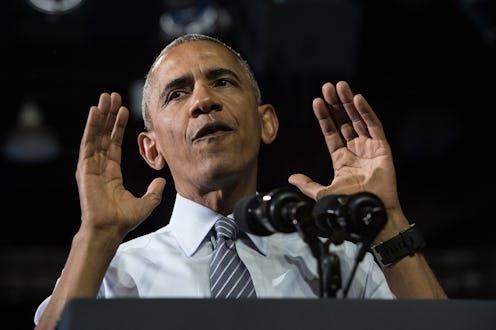News
Obama's Campaigner-In-Chief Role Is Pretty Rare
The 2016 general election season is well and truly upon us, even though the party conventions are still a few weeks away. Presumptive nominees Hillary Clinton and Donald Trump are openly clashing with one another, while the only other candidate still ostensibly in the race, Vermont Sen. Bernie Sanders, has all but conceded. And on Tuesday, yet another sign of the political fight to come appeared on the scene. It's the very rare thing President Obama is doing for Hillary Clinton, which countless other presidents haven't. He's campaigning hard for her, trying to trade on his high approval ratings to benefit his former secretary of state.
Obama has experienced a renaissance in his approval ratings over the last several months ― this week, he reached 56 percent approval in a Washington Post / ABC News poll, which represents his best numbers since 2011, in the aftermath of the American operation which killed Osama bin Laden. On it's face, Obama helping Clinton may not sound too remarkable. Why wouldn't a two-term president campaign for their successor, trying to assist their party's nominee across the finish line? As high-stakes and pivotal as presidential elections are, you might even assume it'd be a given.
But that's far from the reality. Due to a variety of factors ― often low approval ratings, personal tensions, or extenuating circumstances which simply can't be accounted for — it's actually very common for sitting presidents to avoid hitting the campaign trail. As Domenico Montanaro detailed for NPR Tuesday, this is the first time in at least 100 years that a sitting president and their party's nominee will form such a tight alliance.
If you think about what things were like in the summer of 2008, you've got a great example of why a presidential candidate might decline a president's offer to campaign. John McCain did just that, hoping to get as far away from the legacy of then-President George W. Bush as he could. If a party has a broadly disliked president, then there's no way for them to influence the campaign in a positive way.
It's worth noting that this isn't the first time in recent memory a candidate could've had a popular sitting president in their corner, though. In fact, the last willing refusal might rate as one of the most consequential and disastrous mistakes in modern American political history. In 2000, Vice President Al Gore declined to have Bill Clinton campaign with him, despite Clinton's approval rating hovering in the high 50s, and never dipping below 50 percent. Gore allegedly felt wounded by Clinton's lies and involvement in his scandal with Monica Lewinsky, among other things. Gore would go on to lose the presidency, despite winning the popular vote.
In other words, he really should've mended fences with Clinton and asked for his help. And in the case of Clinton and Obama, where there are no deep personal wounds still in evidence (despite the sometimes-ugly nature of the 2008 primaries), they're not going to make that same mistake. It's a huge boon for the Democrats to have an executive still so popular in the twilight of his administration, and Clinton recognized the advantage early on. They're probably going to be joined at the hip over the next four months.
